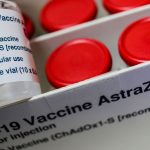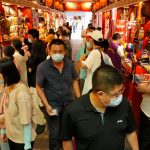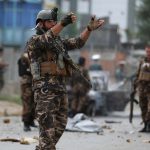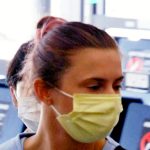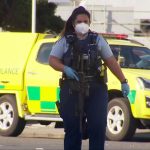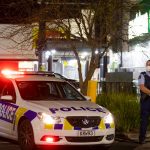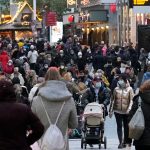Protesters have clashed with police in Vienna, as large crowds demonstrated on the streets of several European cities against the introduction of new COVID-19 restrictions.
Tens of thousands have been voicing their anger in the Austrian capital after the government announced a nationwide lockdown and said coronavirus vaccinations would become mandatory by law next year, blaming the countries’ high infection numbers on those who have failed to take up the jab.
Police said several protesters were detained, but did not give exact numbers. Later, demonstrators threw bottles and beer cans and fired pyrotechnics at police, who used pepper spray to disperse crowds.
And a day after an “orgy of violence” during rioting in Rotterdam left several people injured, thousands more gathered in central Amsterdam, despite organisers calling off the protest in the aftermath of last night’s events when police opened fire on protesters.
Today’s demonstrators left Dam Square and walked peacefully through the city’s streets, closely monitored by officers.
And a few hundred people also marched through the southern Dutch city of Breda to protest COVID-19 restrictions.
Demonstrations against virus measures also took place in other European countries including Switzerland, Croatia and Italy, with thousands taking part.
COVID-19: Germany may follow Austria into full lockdown as coronavirus cases hit new high
COVID-19: Austria imposes lockdown on unvaccinated citizens – as Europe becomes epicentre of pandemic
COVID-19: Austria imposes lockdown on all unvaccinated to deal with surge in coronavirus infections
In Belfast city centre, hundreds gathered to reject the planned introduction of coronavirus certification for nightclubs, bars, restaurants and a range of other settings from 13 December.
Under the compulsory scheme, people wanting to gain entry will have to show evidence of COVID-19 vaccination, a negative lateral flow test result, or proof of a coronavirus infection within the last six months.
And in central Hull, around 200 anti-vaxxers marched through the streets, demanding that carers looking after the elderly and vulnerable should not be forced to have the jab.
In Vienna, people gathered at the public space of Heldenplatz, while about 1,300 police officers were on duty.
They used loudspeakers to tell demonstrators that masks were required, but most did not wear them.
Protesters waved Austrian and other flags and carried signs with slogans like “no to vaccination”, “enough is enough” or “down with the fascist dictatorship”.
Many of the signs focused on the newly-announced coronavirus vaccine mandate: “My Body, My Choice,” read one. “We’re Standing Up for Our Kids!” said another.
Among those taking part were far-right supporters, with the opposition Freedom Party vowing to combat new restrictions that are being brought in to try to combat a surge in COVID-19 cases.
Party leader Herbert Kickl, who announced earlier this week he had tested positive for coronavirus and had to isolate at home, made an appearance via video.
He denounced what he called “totalitarian” measures from a government “that believes it should think and decide for us”.
The nationwide lockdown will start on Monday and will initially last for 10 days, before being re-assessed, and will last a maximum of 20 days.
Most shops will close and cultural events will be cancelled. People will only be able to leave their homes for certain reasons, including food shopping, going to the doctor or doing exercise.
And the government has said it will make it compulsory to get vaccinated from 1 February 2022.
Around 65% of Austria’s population is fully vaccinated against COVID-19, one of the lowest rates in western Europe. In the UK it is about 68%.
Austria’s infection rate is among the highest in the continent, with a seven-day incidence of 971.5 per 100,000 people – and daily cases keep setting records.
Austrian chancellor Alexander Schallenberg has apologised to all vaccinated people, saying it was not fair they had to suffer under the renewed lockdown restrictions when they had done everything to help contain the virus.
“I’m sorry to take this drastic step,” he said on public broadcaster ORF.
Please use Chrome browser for a more accessible video player
While Austria so far stands alone in the EU in making vaccinations mandatory, more and more governments are clamping down.
From Monday, Slovakia is banning people who have not been vaccinated from all non-essential stores and shopping centres.
They will also not be allowed to attend public events or gatherings and will be required to test twice a week just to go to work.
Slovakia, where just 45.3% of the 5.5 million population is fully vaccinated, reported a record 8,342 new virus cases on Tuesday.
German Chancellor Angela Merkel has said: “It is really, absolutely, time to take action.” With a vaccination rate of 67.5%, her nation is now considering mandatory vaccinations for many health professionals.
Greece is also targeting the unvaccinated. Prime Minister Kyriakos Mitsotakis has announced new restrictions for the unjabbed, including stopping them entering venues such as bars, restaurants, cinemas, theatres, museums and gyms, even if they have tested negative.
Follow the Daily podcast on Apple Podcasts, Google Podcasts, Spotify, Spreaker.
During last night’s violence in Rotterdam, protesters in the port city had gathered to voice opposition to government plans to restrict access to indoor venues to people who have a “corona pass”, showing they have been vaccinated against COVID-19 or have already recovered from an infection.
The pass is also available to people who have not been vaccinated, but have proof of a negative test.
In an effort to slow a resurgence of the coronavirus, the Dutch government last week announced a three-week partial lockdown, in which restaurants and shops must shut early.
No spectators are allowed at sporting events, and people are only allowed four visitors to their homes.



